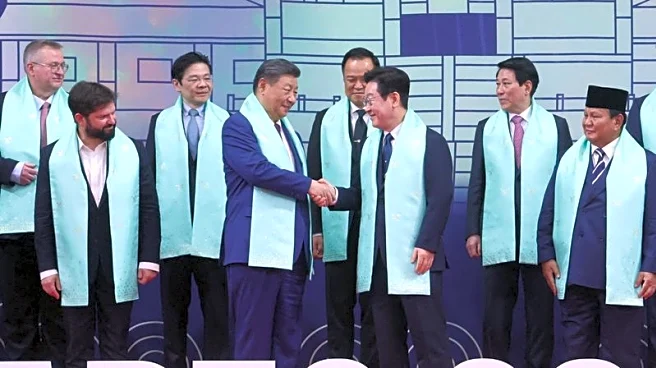By Jihoon Lee, Ju-min Park and Eduardo Baptista
GYEONGJU, South Korea (Reuters) -Facing deepening fractures in the global trade order, Asia-Pacific leaders adopted a joint declaration that emphasised the need
for resilience and shared benefits in trade at the end of the annual APEC summit on Saturday.
The Asia-Pacific Economic Cooperation meeting, hosted by South Korea this year, unfolded under the shadow of rising geopolitical tensions and aggressive economic strategies - ranging from U.S. tariffs to China's export controls - that have pressured global trade.
Ahead of the gathering, U.S. President Donald Trump announced trade deals with a number of countries, including China and South Korea. But he left before the summit kicked off.
Washington's views, however, remained on display in the declaration, analysts said, which, unlike last year's document, did not mention multilateralism or the World Trade Organization.
"It is a result of member countries acknowledging, at least to some degree, that it will be difficult to restore a free trade order based on multilateralism and the World Trade Organization," said Heo Yoon, a professor of international trade at Sogang University in Seoul.
"We cannot deny anymore that there is a paradigm shift in the global trade order."
With Trump's swift exit before the summit, China sought to position itself as a steady advocate of free and open trade, a role the U.S. had dominated for decades. China will host APEC in Shenzhen in 2026, President Xi Jinping announced.
In closing remarks, Xi proposed the establishment of a World Artificial Intelligence Cooperation Organization, while the gathering adopted other declarations on demographic change and AI. But there was no mention of AI regulations.
"China is clearly taking advantage of Trump's absence at APEC to actively engage countries worried about the retreat of the U.S. and China's rise," said Li Xing, a professor at the Guangdong Institute for International Strategies.
"It's certain they will be reassuring countries like South Korea that can no longer fully count on U.S. backing due to Trump, that they're not seeking hegemony but common enrichment."
However, Heo and analysts say the joint declaration suggests that member nations were wary of giving an impression that the U.S. was undermining free trade while picturing China as a guardian of multilateralism.
"Few countries believe there can be a new trade order that excludes the U.S.," he said.
SOUTH KOREA'S LEE HOSTS XI JINPING
China's Xi wrapped up his three-day visit to South Korea on Saturday with a state dinner and summit hosted by President Lee Jae Myung, the newly elected U.S. ally who has pledged to balance Seoul's ties with Beijing.
The stakes were high for Lee, who assumed office in June after the ouster of his hawkish predecessor over a failed attempt to impose martial law. Lee faces the dual challenge of protecting South Korea's export-driven economy and easing tensions with North Korea amid rising China-U.S. competition.
Lee said it was difficult to say that relations between South Korea and China had ever been completely normalised, and he hoped for a substantial improvement.
"We must go beyond simple restoration to find a path of cooperation that is beneficial to each other," Lee told a press conference ahead of his planned meeting with Xi.
Earlier this week, Lee also hosted Trump for a rushed state visit, showering him with gifts and praise before announcing a surprise trade deal aimed at lowering U.S. tariffs in return for billions of dollars in South Korean investment in the U.S.
Lee held similar events for Xi on Saturday, including a summit meeting and state dinner. This was Xi's first visit to South Korea in 11 years.
NORTH KOREA ON AGENDA
Lee asked Xi for China's help in engaging North Korea, according to Seoul's presidential office. Chinese state media did not mention North Korea in their reports on the meeting.
After the South said Lee would raise denuclearisation of the Korean peninsula with Xi, North Korea, a military and economic ally of China, issued a statement on Saturday dismissing any efforts to remove its nuclear arsenal as an unrealisable "pipe dream".
Trump had offered to meet North Korean leader Kim Jong Un during his visit to South Korea, but Pyongyang did not make a public response.
Trump met Xi on Thursday ahead of the APEC summit, striking a deal that includes lower U.S. tariffs on Chinese goods in exchange for Beijing's crackdown on the illicit fentanyl trade, the resumption of U.S. soybean purchases and a continued flow of rare earth exports. The Chinese president also held talks with the leaders of Japan, Canada, and Thailand.
Taiwan's representative to the APEC summit, Lin Hsin-i, said on Saturday he and U.S. Treasury Secretary Scott Bessent discussed supply chains and semiconductors during a meeting on the sidelines of the event.
(Reporting by Ju-min Park, Joyce Lee, Jihoon Lee, and Eduardo Baptista; writing by Josh Smith; editing by Himani Sarkar and Mark Heinrich)










